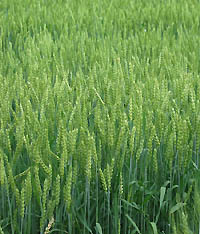No-Till Wheat Continues to Increase
No-Till Wheat Continues to Increase

No-till wheat production has increased in recent years. With high energy costs and a method that requires less equipment passes through the field, no-till likely will get even more scrutiny from farmers.
Scientists with the University of Kentucky College of Agriculture have been doing research on no-till wheat for nearly two decades beginning with small plots and expanding in recent years to large on-farm plots. The results have shown the method can be as productive as traditional tillage.
“If you farm and feel the pinch from extra fuel costs and want to make the change, I feel very comfortable with all the data we have,” said Lloyd Murdock, UK soils specialist.
Murdock highlighted the work he, Jim Herbek, UK grains specialist, and others have conducted during a recent UK wheat field day. When the research began in the late 1980s only a few farmers in far western Kentucky were experimenting with the production method. At that time, almost all of the wheat planted for grain in Kentucky was produced using tillage.
“In 2004, about 42 percent of the wheat planted for grain production was no-tilled,” he said. “We’ve come a long way in no-till wheat.”
In the first years of the study, no-till practices tended to result in a slight yield reduction compared with tilled fields. But in the past seven years, that has changed with no-till wheat performing on par or even ahead of tilled wheat, Murdock said. Changes in soil structure from no-till practices along with improving varieties are some factors in the shift.
Over the years, research has focused not only on the impact no-till has on wheat yields, but also on its effects on subsequent soybean and corn crops. In general, about half the time one of the next two crops will see a bump in yields.
Farmers have been more reluctant to embrace no-till farming practices for wheat than corn and soybeans in Kentucky. They were somewhat reluctant to make the switch based solely on small plot research but with the larger on-farm work of recent years, that is changing, Murdock said.
These tests were done with the farmers doing the work – using their equipment and management practices.
“A lot of these people weren’t sold on it but agreed to do this,” he said. “They did no-till wheat and tilled wheat in the same field then came back with no-till soybeans and corn.”
The research showed there was no difference between the two tillage practices for wheat production. One of the cooperative farmers switched his traditional tilled wheat practices to no-till in all his fields except the test field after two years of participating in the field trials.
“Basically, he no-tills because he can save money,” Murdock said. “These farmers are proving to themselves that the system works.”
